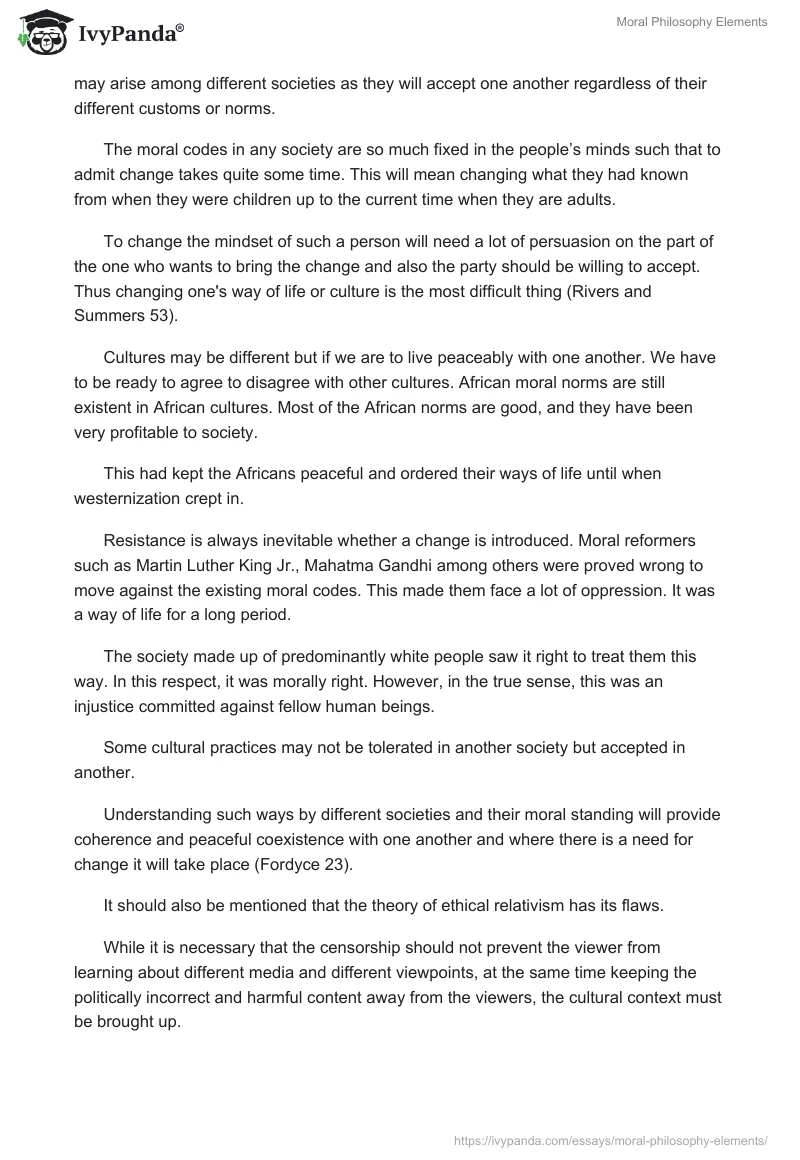Imagine yourself at a crossroads, faced with a difficult decision. Do you choose the path that benefits the most people, even if it means sacrificing your own interests? Or do you follow your own moral compass, even if it leads to a less desirable outcome for others? These are the kinds of questions that moral philosophy tackles, delving deep into the nature of right and wrong, exploring different ethical frameworks, and prompting us to critically assess our values.

Image: ivypanda.com
In this article, we’ll uncover the core elements of moral philosophy, exploring the classic theories and contemporary insights that shape our understanding of morality. We’ll decipher intricate concepts like virtue ethics, deontology, and utilitarianism, and examine how these principles apply to our everyday lives. Whether you’re a seasoned philosopher or simply seeking a deeper understanding of ethics, this exploration will provide valuable insights for making ethical decisions and navigating the complexities of the human experience.
A Journey Through the Foundations of Morality
Moral philosophy, also known as ethics, is a branch of philosophy that examines the nature of morality. It’s a vast and intricate field, spanning centuries of thought and grappling with fundamental questions about the good life, the nature of justice, and the very meaning of “right” and “wrong.” But at its core, moral philosophy aims to understand the principles that guide moral behavior and help us make sound ethical choices.
The history of moral philosophy is rich and diverse, with influential thinkers from ancient Greece to the modern era shaping our understanding of ethics. Socrates, the father of Western philosophy, famously advocated for the pursuit of virtue and the importance of self-knowledge. Plato, his student, developed a complex theory of Forms, arguing that true knowledge lies in understanding the abstract forms of moral concepts like justice, beauty, and goodness. Aristotle, on the other hand, focused on the importance of developing virtuous habits, emphasizing moral character as the key to a good life.
Navigating the Ethical Frameworks: Virtue, Deontology, and Utilitarianism
Throughout history, various ethical frameworks have emerged, each providing a different lens through which to analyze ethical dilemmas. Let’s delve into three prominent frameworks:
1. Virtue Ethics: Cultivating Moral Character
Virtue ethics, rooted in the teachings of Aristotle, emphasizes the importance of developing good character as the foundation of moral behavior. Instead of focusing on rules or consequences, virtue ethics emphasizes the cultivation of virtuous traits like honesty, courage, kindness, and justice. This approach suggests that acting ethically stems from the internal qualities of an individual, rather than external factors.

Image: www.goodreads.com
2. Deontology: Following Moral Rules
Deontology, championed by philosophers like Immanuel Kant, places emphasis on moral duties and principles. It argues that certain actions are inherently right or wrong, regardless of their consequences. Deontology often centers around universal moral laws, such as the categorical imperative, which dictates that we should act only according to principles that we could universalize.
3. Utilitarianism: Maximizing Happiness for the Greatest Number
Utilitarianism, formulated by philosophers like Jeremy Bentham and John Stuart Mill, concentrates on maximizing happiness and well-being for the greatest number of people. This approach focuses on the consequences of actions, advocating for choices that produce the most positive outcomes for society as a whole. Utilitarianism often involves cost-benefit analyses, weighing the potential benefits and harms of different actions to determine the most ethical course.
Ethical Considerations in the Modern World
Contemporary moral philosophy faces new challenges and complexities, grappling with issues arising from technological advancements, globalization, and the interconnectedness of our world. Questions about artificial intelligence and its implications for ethical decision-making, the ethics of genetic engineering, and the impact of climate change on future generations demand careful ethical consideration.
Moreover, moral philosophy has played a vital role in shaping legal systems, political discourse, and societal norms. It helps us navigate ethical dilemmas in the workplace, in our personal relationships, and in our roles as citizens.
Seeking Expert Insights and Embracing Ethical Action
For further guidance on navigating the complexities of moral philosophy, consider engaging with the works of renowned contemporary ethicists like Peter Singer, Martha Nussbaum, and Michael Sandel. Their insightful perspectives on issues like animal rights, global justice, and the nature of morality can provide a deeper understanding of the challenges facing us today.
Ultimately, the journey of understanding moral philosophy is a lifelong process of critical reflection, dialogue, and ethical action. It’s about engaging with diverse perspectives, wrestling with difficult questions, and ultimately shaping our own moral compass to navigate the world with integrity and compassion.
The Elements Of Moral Philosophy Pdf
Conclusion: Embracing Ethical Responsibility
Moral philosophy is not a mere academic pursuit; it’s a vital tool for navigating the intricacies of human life. From understanding our own values to navigating complex social issues, engaging with ethical frameworks helps us make informed decisions and contribute to a more just and equitable world. As we continue to grapple with the challenges of our time, the principles of moral philosophy provide a roadmap for ethical action, reminding us that while the pursuit of the good life is often complex, it’s a quest worth undertaking with wisdom, courage, and compassion.





